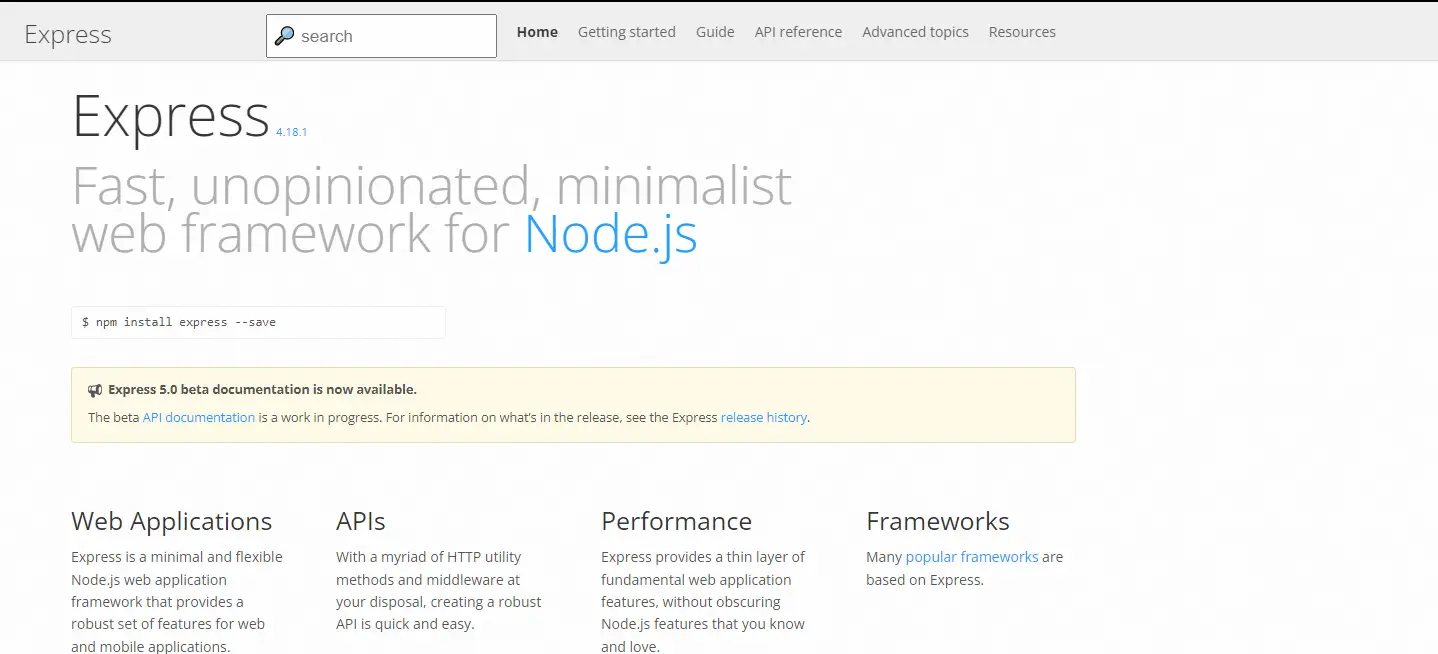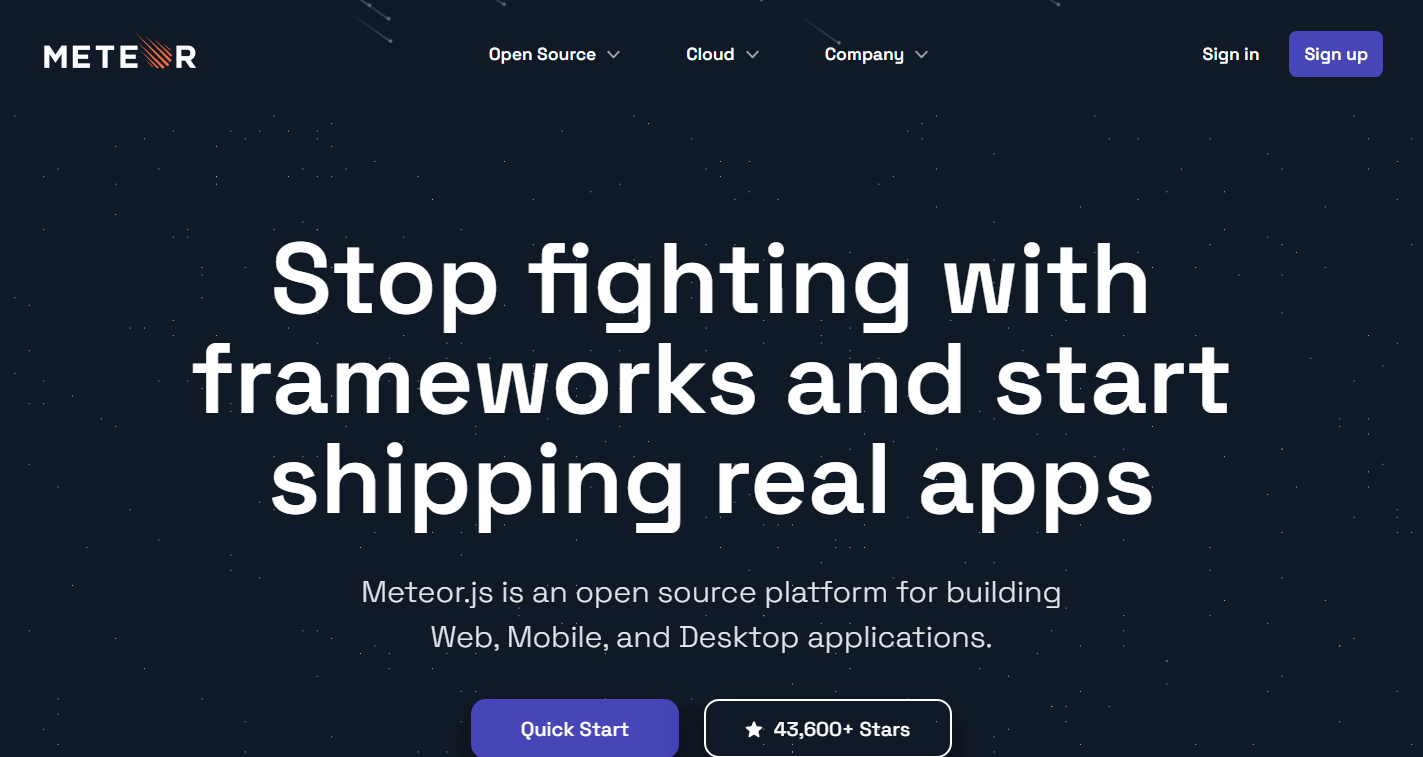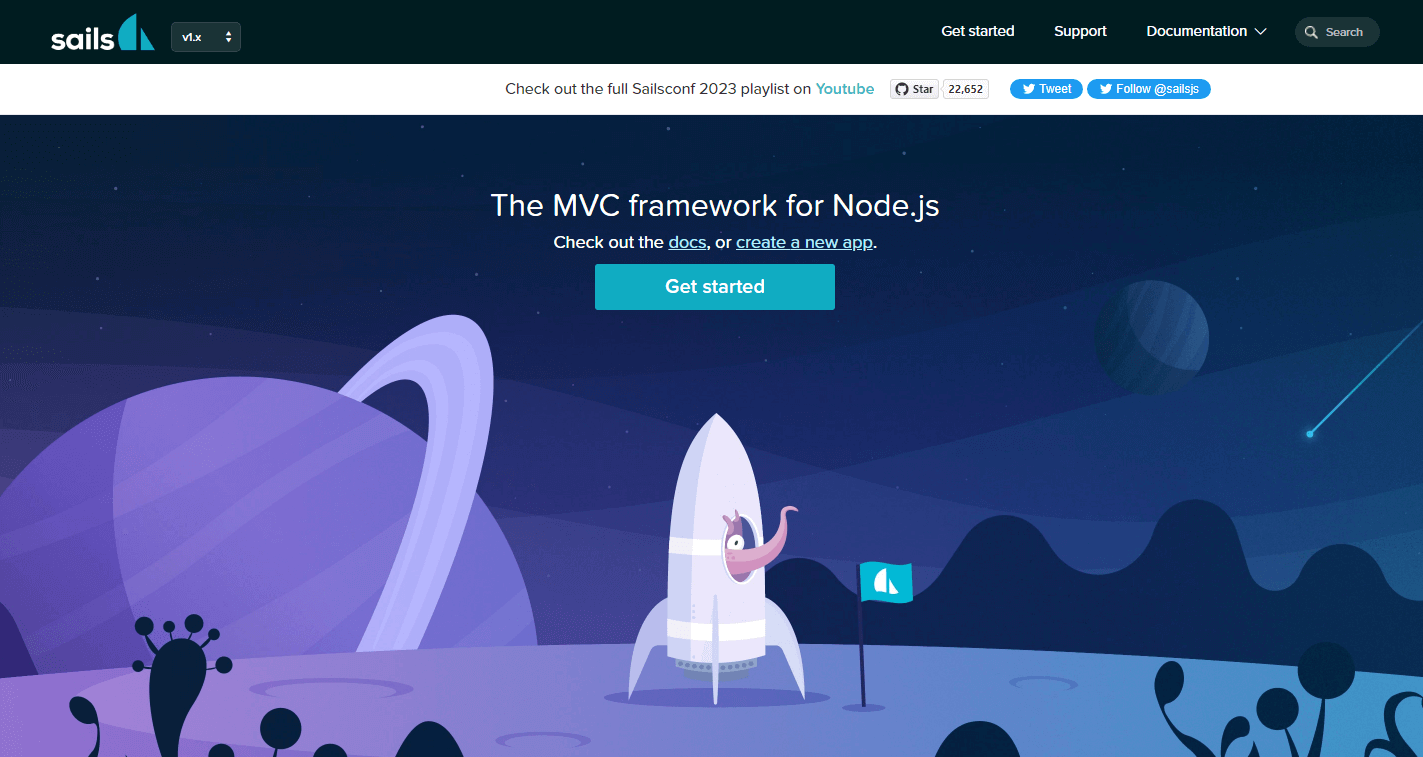Top NodeJs Framework to Learn
The world of web development is evolving in a fanatic space. It seems like every day a new tool or technology is created as a must-have. Well, some of these do end up being popular and important while others often fade away! We are fortunate enough to witness such technology that offers a never-ending supply of innovations and remarkable outcomes. I am talking about none other than our very own Javascript. Not to mention, there are several reputable Node.js software development service providers striving hard to make the most of the dynamic framework and offer unmatched solutions.
In today's competitive times, a website is supposed to be attractive and appealing, so which framework or technology you are using is extremely important. However, you can certainly opt for some cookie-cutter solutions such as Javascript frameworks like Angular, Node.js, React.js, Vue.js and so more!
Now we all know that a framework is the core foundation of the entire web development project and Javascript frameworks are no different. Here developers are able to unleash their coding potential with a set of pre-written codes. The following post focuses on how to get started with Node.js and what are the best Node.js frameworks to consider for your application development project. And trust me, each of the below-mentioned frameworks excels in terms of speed, high-end performance, security, and results in bringing out the best possible outcomes for web development.
With the dawn of 2023, the demand for web applications seems to have risen and the graph will keep on trending upwards. So in other words, it has become quite challenging for businesses of all sizes and industry verticals to create an online presence that's not just strong but offers the ultimate user experience. So you see developers all across the globe are looking around for frameworks that not just ensure seamless development but also work wonders for the end users. And this is where Node.js frameworks exactly fit in.
- Introducing Node.js Framework
- Benefits of Node.js
- Top Node JS Frameworks to Learn
- Final words
Table of Contents
Introducing Node.js Framework
It may be quite surprising to know that there are people who don't believe that Node.js is a framework. However, it is a Javascript runtime environment where it is quite possible for developers to execute different codes on the server side. So what happens next? You end up receiving the best possible outcomes.
The open source, cross-platform, and single-threaded JavaScript framework is successfully powered by the JavaScript V8 runtime engine. And not only that, it features event-driven, non-blocking I/O architecture. So now you know what is the reason behind the increasing popularity of the Javascript framework or why 1.2 percent of all websites/more than 20 million websites are powered by Node.js technology?
Earlier, Javascript was a client-side scripting language that assisted in the backend development. So what developers used to do back then, they had to place code between <script></script> tags in the HTML document. So in layman's terms, the Javascript code ran in the browser. And this definitely hampers the code maintainability and speed. So as a result, a separate runtime environment was introduced, the runtime which is capable of handling such critical situations resulting in a sudden boost to web apps and not hampering the code maintenance and speed. Enter Node.js and everything else changes.
Moving on! Let's take a look at why Node.js is a go-to choice for developers across the globe and why it is worth considering.
Benefits of Node.js
Built on Chrome's V8 JavaScript engine, Node.js offers a wide range of benefits and advantages. By the end of the following post, I assure you will know why Node.js is the game changer in the front-end and back-end development realm.
#1 Scalable
In the present times, high-end flexibility and scalability are pretty much given importance especially when you are looking for a tech stack. And Node.js excels in both aspects. From handling concurrent requests efficiently to managing load balancing for all CPU cores. And do you know what is the best part? Node.js has the potential to divide the app horizontally and successfully, all thanks to child processes. In fact, due to its single-threaded nature, high-end scalability is possible. So if you are willing to cater to different client preferences at the same time, it is feasible to use Node.js.
#2 Cost-effective
The next reason to consider Node.js for your web development project is that it turns out to be one of the most cost-effective solutions. You see, the javascript language is used for both front-end and back-end development, so a high amount of time and money can be saved here. Moreover, Node.js projects can be accomplished with fewer files and less coding. So don't worry even if you have limited funds, you will be able to carry out a successful web development project.
#3 Faster Time-to-Market
The next benefit of considering Node.js is that it takes a few months to code, develop, test, and deploy Node.js projects. Yes, this is the same case for projects on a tight budget and a lean team of beginners. The javascript framework itself ensures a shorter time-to-market cycle. As mentioned earlier, the technology is lightweight. And not just that, a seamless amount of application development time can be reduced. Also, simple and quick deployments can result in immediate feedback and necessary changes can be made on time.
In addition to all these, Node.js comprises a large community of developers and veterans who are tech enthusiasts and well-experienced across the globe. So even if you get stuck somewhere, these people are right here to assist at any point in time. Apart from this, here you will find a powerful package manager, NPM, offering over 2.1 million packages of reusable components to expedite code sharing and enhance functionality.
Now without much further ado, we will be focusing on some of the most alluring, intimidating Node.js frameworks to take into account for 2023.
Top Node JS Frameworks to Learn
1. Express.js

The first and foremost Node.js framework to consider is Express.js. One of the obvious reasons for considering Express.js is that here developers can easily get started with. It features a minimalistic approach and can be considered as eternally classic and straightforward. So if you are afraid of delving into the steeper learning curve then simply forget about it because Express.js requires you to have a basic understanding of programming skills. No wonder the particular Node.js framework has around 18 million downloads per week. Launched back in 2010, Express.js is highly recommended by companies such as Fox Sports, PayPal, Uber, IBM, Twitter, Stack, Accenture, etc.
Some of its amazing bunch of features include:
- Speedy server-side development
- Great performance
- High test coverage
- Easy debugging
- Generates app
- Negotiates the content
- Amazing routing
- Quick response to HTTP requests
What makes express.js enter the following list? Well, some of its unrendered features and functionalities such as detailed routing, configuration, security features, debugging mechanisms, etc.
2. Meteor.js

The next interesting Node.js framework to take into account is Meteor.js. Now there are times when developers are willing to use only one particular framework for their project, during those tough times Meteor.js definitely works wonders. Now this one was incepted after express.js, i.e. in the year 2012. And since then the open-source, isomorphic, Javascript framework has gained popularity by contributing towards the development of several mobile apps and desktop applications.
Here one of the most amazing features of Meteor.js is that it comprises an amazing bunch of libraries that are pretty comprehensive and result in the development of applications featuring high-streaming, real-time functionalities. Again why Meteor.js is known as a popular Node.js framework?
- It's open source, isomorphic Javascript framework
- It works wonders as a cross-platform framework
- High-end performance and community support
- Full-stack solution
- Quick interactions
- Easy integrations
Apart from these, Meteor.js is pretty easy to get started with, and ensures that different kinds of applications can be developed in the predetermined time. Maybe that's the reason why this framework is recommended for developing real-time applications featuring shorter deadlines. So basically there is no such reason not to consider Meteor.js as a splendid choice. Isn't it?
3. Sails.js

The next amazing Node.js framework to consider is Sail.js. Now this one is a Model-View-Controller-based framework that is highly based on Ruby on Rails. It may also interest you to know that Sails is mainly used to develop REST APIs, real-time applications, or single-page applications. And you know what, all this is done with minimal code writing. It supports data-driven apps and a wide range of databases including MongoDB, MySQL, Postgres, Redis, and more.
Some of the core features of Sails.js include:
- Frontend Agnostic
- Auto-generated RESTful APIs
- Integration of Socket.io for WebSockets and Express for HTTP requests
- Reusable security policies
- Object Relational Mapping (ORM) for effective compatibility of the framework with databases
What's more to ask for, the Node.js framework is successfully linked to Socket.io, a JavaScript library. So adding any functionality such as real-time or event-based transmission is not an issue. In other words, adding live chat to your website is possible using Sail.js.
Final words
Since it offers easy development, smooth scalability, reusable code, capability to handle multiple requests, seamless code execution, first-class prototyping, easy development of microservices, and support by large giants, why not consider Node.js for your upcoming web development project?
And what's more to ask for? Whether you are willing to develop real-time web applications or messaging applications, social media applications, multiplayer games, REST API servers, IoT applications, chatbot programs, single-page applications, real-time collaboration tools, or online payment systems, all the aforementioned Node.js frameworks work wonders for a plethora of development projects.
So this is all for now! I hope you did find the following post worth your time and energy. If yes, do not hesitate to share among your peers and help us in reaching us to more enthusiastic readers like you. Happy Reading!
